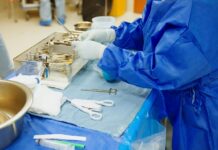DONORS to Royal Columbian Hospital Foundation are helping to fund new equipment worth hundreds of thousands of dollars, following the charity’s latest round of special purchases.
A partnership between the Foundation and Fraser Health, along with some generous commitments from hospital physicians, has resulted in more than $890,000 for some of Royal Columbian’s biggest needs, benefitting several medical departments. The funding includes numerous gifts made by thousands of donors for greatest needs.
The hospital’s Breast Imaging Centre is receiving an upgrade to its technology that will help improve breast cancer detection rates and reduce the number of false positives. The hospital will become the first in Fraser Health to use Digital Breast Tomosynthesis. The department performs more than 4,200 mammograms each year.
Urologists will have access to 13 new flexible cystoscopes, which are used for diagnosis and follow up care for conditions including bladder cancers, voiding dysfunction, infections and incontinence. As many as 4,000 patients will benefit annually.
A digital slide scanner will aid in the diagnosis of tens of thousands of patients each year, by allowing digital images to be produced by the lab’s Anatomic Pathology department and reviewed more easily by multiple specialists. Anatomic pathologists diagnose disease and cancer from tissue specimens as well as fluid samples, and the department has one of the largest caseload volumes in BC.
Three new neonatal ventilators will help premature babies as young as 23 weeks and weighing as little as 370 grams. The hospital’s Variety Neonatal Intensive Care Unit is consistently among the top in the country for achieving excellent survival rates. The newer ventilators provide the latest advances in protective lung ventilation for premature babies.
New equipment will help speech-language pathologists evaluate how well patients can swallow. Patients with swallowing issues are more likely to develop pneumonia, poor nutrition, recovery delays and longer stays. This endoscopy equipment is brought to the bedside, and for complicated and critically ill patients, may be the only way accurately assess and treat swallowing difficulties.
Two new transport monitors will help monitor and potentially defibrillate unstable patients who are being moved from one place to another for tests, treatments, and even hospitals. As BC’s busiest cardiac care centre, Royal Columbian Hospital serves as the region’s emergency room for the heart.












